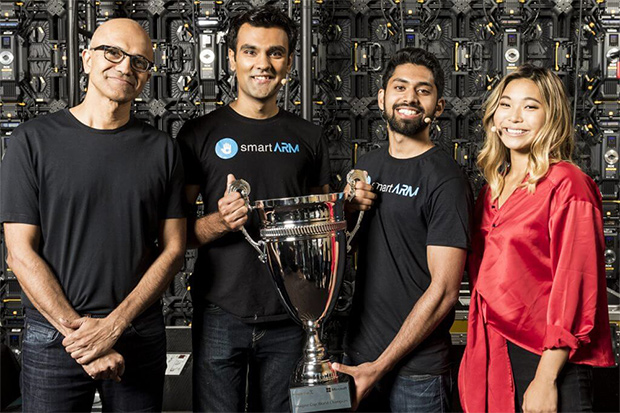Mechatronics Engineering student Hamayal Choudhry wins big in worldwide Microsoft competition
Third-year student reimagines prosthetics with smartARM invention
August 15, 2018

Hamayal Choudhry has shown the world he can dream big and make his ideas come to life.
In late July, the University of Ontario Institute of Technology Mechatronics Engineering student, together with his teammate Samin Khan from the University of Toronto, competed in the 16th-annual Microsoft Imagine Cup World Finals, and won—bringing the cup to Canada for the very first time.
Imagine Cup challenges student developers to harness their imagination, passion for technology and vision of a brighter future to develop a solution to a big problem. More than 40,000 students from across the world registered this year to compete in Imagine Cup national competitions, delivering business pitches and technical demos of their innovative projects in front of a panel of judges. After several months of fierce competition, 49 teams from 33 countries progressed to the World Finals, held July 23 to 25 at Microsoft’s headquarters in Redmond, Washington.
Choudhry and Khan took home the Imagine Cup for smartARM, a 3D-printed robotic prosthetic hand for amputees. With a camera built into the palm, the hand uses Microsoft Azure computer vision and machine learning technology to identify objects and calculate the most appropriate grip for them. The more the hand is used, the more accurate it becomes.
Team smartARM won a mentoring session with Microsoft CEO Satya Nadella, as well as US$130,000 in cash and credits on the Microsoft Azure platform to continue developing smartARM.
Why develop smartARM?
In recent years, researchers have made many significant advancements in the realm of prosthetics, developing highly functioning, technologically advanced limbs that respond to muscle movement. But with an average price tag of US$100,000 for a bionic arm, anything beyond a basic prosthesis is simply unaffordable for most amputees.
“We saw that a really big problem right now is that, despite there being these really cool prosthetic devices, they are so expensive,” says Choudhry in smartARM’s Imagine Cup Showcase video. “We really wanted to use the current advances in AI (artificial intelligence) and machine learning to improve someone’s quality of life.”
Thanks to 3D printing technology, smartARM can be manufactured for less than US$100.
What’s next?
SmartARM is in contact with Sunnybrook Health Sciences Centre’s Amputee Care & Prosthetic Services department to continue working on the project. The duo has also discussed their startup potential with the office of the Honourable Navdeep Bains, Canada’s Minister of Innovation, Science and Economic Development.



